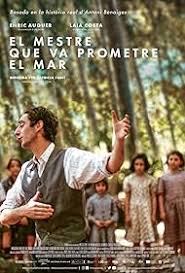
THE TEACHER WHO PROMISED THE SEA/ El mestre que va prometre el mar
Spain, 2023, 105 minutes, Colour.
Enric Auquer, Laia Costa, Louisa Gavasa, Ramon Agirre, Gael Aparicio, Alba Hermoso, Nicolas Calvo.
Directed by Patricia Font.
This is a film with moments of hope but also many moments which are grim. Perhaps the title indicates this – promise but whether the promise can ever be fulfilled.
This film is based on an actual character and events, with tributes and photos during the final credits. The setting is Spain in the mid 1930s, at the outbreak of the Civil War. However, there is a framework for the Civil War story, an elderly man in an aged care home, the concern by his granddaughter about his health, and wanting to know more about his past during the 1930s. The film shows the range of excavations of mass graves which have taken place in recent decades, she’s too horror of the discovery of the skeletons, so numerous, the need for identification – and this all over Spain, a map indicating the number of mass graves.
With her investigations, going to the town where her grandfather lived, finding one of his schoolfriends, the action of the film goes into flashbacks. Especially a focus on the new school teacher, Antonio (Enric Auguer). Antonio has arrived, a friend in the town publishing his articles with socialist bent, trying out various experiments with the small group of children, getting them to participate themselves in their own education, programs, activities. This, of course, causes difficulties, especially with the Mayor whose young daughter is in the class, feeling herself superior to the rest of the children.
The teacher has to look after one of the children, Carlos, whose father is in prison. And this is the young boy who will become the grandfather in the aged care home.
In terms of a film about education, this is the work of the pioneers who want to involve the children in their education and not just be subject to curricula. And, Antonio is atheist. This elicits on the part of the very stern parish priest.
The children have never seen the sea and that is one of the promises that Antonio makes. However, the war breaks out, audiences have seen troops and fascist factions roaming through the village. Ultimately, the military arrives, the village people have to take a stands, Antonio very much supported by the old widow who has been his housekeeper, the mayor taking the side of the troops.
It is sad to see the treatment of Antonio, the response of the children, of the people in the village, his being taken into prison, all put by Carlos’s father, and a particularly plain but moving sequence where Antonio is taken out into the hills, the soldiers having a smoke before casually shooting him.
Audiences have been continually interested in Spanish Civil War stories this is a strong addition to these stories, based on actual characters and events, but continually questioning the behaviour of right-wing extremists.
- Audience interest in Spain, the 20th century, the Civil War, the aftermath with Franco, the 21st century and dealing with the history, the murders, the digging up of the mass graves, younger generations searching for understanding of ancestors?
- The town, in the 1930s, homes, farms, schools, the church? 21st-century and mass grave sites, the excavations? And residents in care? The musical score?
- The interplay between the two time periods? The concern of the present, Carlos in aged care, his daughter, granddaughter, her illness, her own daughter, concerned for her grandfather, his stroke? The information about the graves, the travel, the discussions with Laura, the nature of the excavations, the information, the bones and skeletons, DNA tests for identity? Arianna and her anxiety, disappointment, the discussions with Emilio, his support, going to see Josefina, spurned, her daughter bringing the documents, the examination with Emilio, the return to her grandfather?
- 1935-1936, the political situation, the rise of the fascists, the patrolling of the towns with fascists, the entry of the Army? Anti-communism? The ordinary people of the town, Catholic background, working, their families? The role of the parish priest, his severity – and his look at the end when Antonio had been tortured?
- The story of Antonio, teacher, new appointment, interactions with the Mayor, the children at the school, their families, Carlos and his imprisoned father, Josefina daughter of the mayor, her severe mother, Emilio and his father, unable to read, demanding on his son for work? Antonio and his principles for education, less formal education, more questions, experiments, solutions? Telling stories? The writing of the pieces, compiling the books, printing the books? The effect on the children, their enthusiasms? The issue of the sea, the promise to go there, the reluctance of commissions, the mayor and his wife, Emilio’s father, Antonio reading Emilio’s story, the permission? The episode of the photo and the children’s delight?
- Antonio, atheist, taking down crucifix, respect for faith in the church, his articles in the paper? The mayor and his comments? The hostility of the parish priest?
- Antonio settling in, Charo and her work, the conversations, the gradual warming and friendship, her warnings about his politics, support? Her sadness at his arrest?
- Carlos, unable to read, his father not teaching him, hostility to Antonio, Antonio persuading him to write letters to his father, learning, embracing Antonio?
- Inspector, the mayor and the parish priest, the excellent performance by the students?
- Life in the town, the festivities, the dancing, yet the shadow of fascism?
- Antonio arrested, tortured, bound, drained through the town, everybody watching, the children upset? Into the cell, Carlos’s father helping him? His friend who had supported him with his publications? His being dragged out, into the countryside, the soldiers having their smoke, and the shooting?
- Spain, the decades after Franco, coming to terms with history, and the history of the search for the mass graves?